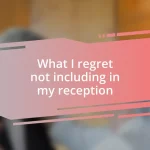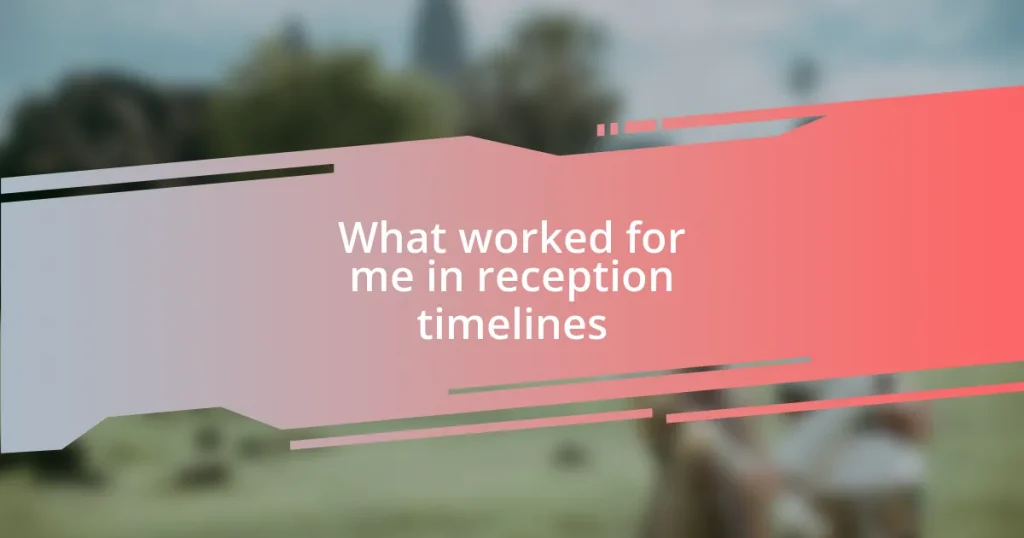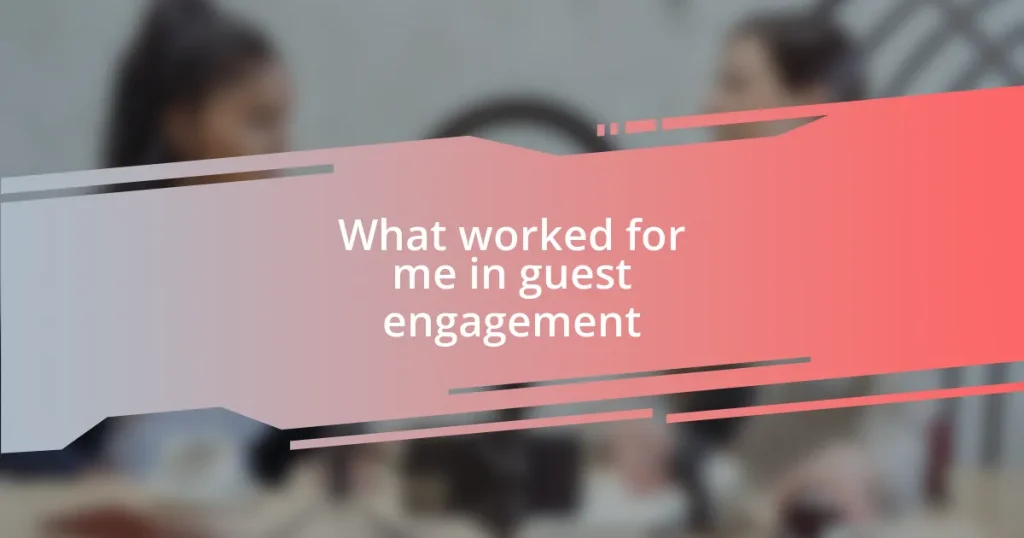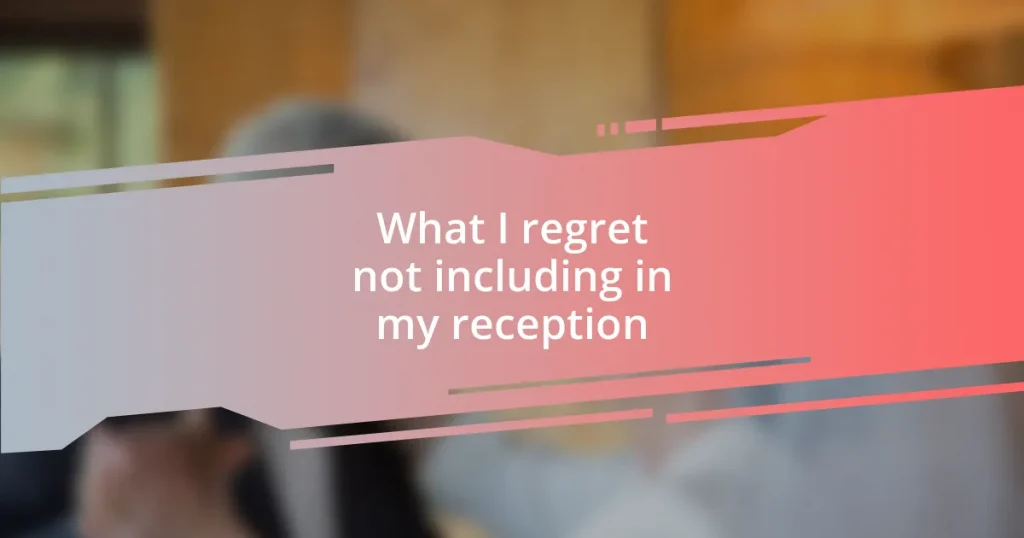Key takeaways:
- Identify key sources of stress, such as budget concerns, decision-making, and external pressures from family.
- Set realistic expectations to avoid perfectionism; prioritize budget awareness, time constraints, and essential tasks.
- Create a detailed timeline and adjust it as needed to manage tasks effectively and maintain flexibility.
- Delegate responsibilities based on strengths and utilize planning tools to streamline the planning process.

Identify Sources of Stress
Identifying the sources of stress during wedding planning is crucial for maintaining your sanity. Personally, I found that just thinking about the budget felt like a weight on my shoulders. Have you ever felt that paralyzing squeeze when you realize how much everything adds up? Knowing where the stress originates can help you address it head-on.
Another significant source of tension for me was the decision-making process. Choosing vendors or selecting a venue often left me second-guessing my choices. I remember the sleepless nights I spent wondering if I was making the right decisions. It made me realize that I needed to trust my instincts and align my choices with my vision for the day.
Lastly, the pressure from family and friends added another layer of complexity. One particular instance was when my mom suggested a different venue after I had already booked mine. It’s tough to balance expectations with personal wishes. Have you felt that tug-of-war between pleasing others and staying true to your desires? Recognizing this source of stress helped me set clearer boundaries, allowing me to focus on what truly mattered.

Set Realistic Expectations
Setting realistic expectations was a game-changer for my wedding planning journey. I had this grand vision in my mind, but over time, I learned that striving for perfection only led to disappointment. I recall a moment when I dreamed of a lush, elaborate floral arrangement, only to discover how quickly prices skyrocketed. It hit me hard that sometimes, less is more. Embracing simplicity and understanding that not every detail needs to be extravagant helped ease the pressure.
Here are some insights I found invaluable when establishing those realistic expectations:
-
Budget Awareness: Understand your financial limits and plan accordingly. I remember adjusting my expectations significantly after a budgeting meeting with my partner.
-
Time Constraints: Acknowledge that not everything can be done in a day. Delegating certain tasks really relieved my stress, especially as the big date approached.
-
Guest Count: Instead of inviting everyone I know, I focused on inviting those who truly mattered. This made the process more intimate and special.
-
Prioritization: Identify non-negotiables versus nice-to-haves. For me, the photography was a must, while the cake design could be simpler.
-
Flexibility: Be prepared for things to go awry. When my chosen DJ fell through, I pivoted and found a fantastic replacement who brought a unique vibe to the celebration.
By framing my expectations within these boundaries, I felt a sense of control that made planning more enjoyable rather than overwhelming.

Create a Detailed Timeline
Creating a detailed timeline for wedding planning was one of the best strategies I implemented to keep myself on track. I remember sitting down with my planner and marking key milestones, such as booking the venue and sending invites. There’s something incredibly satisfying about checking off tasks one by one, and it provided a solid structure that made the overwhelming process feel manageable. When was the last time you felt that sense of accomplishment from checking off items on your to-do list?
I discovered that breaking down the timeline into smaller, more digestible chunks played a huge role in reducing my anxiety. Instead of stressing over everything at once, I focused on one task per week. For instance, the week dedicated to floral arrangements was just about that; I didn’t worry about seating charts or cake choices until the following week. This approach allowed me to pour my energy completely into each aspect, making the entire planning experience much more enjoyable.
A common pitfall for many couples is neglecting the revision of this timeline as the wedding date approaches. I learned this the hard way when I initially underestimated how long it would take to coordinate everything. One week, I thought it’d be easy to finalize the guest list, only to realize I had to chase down RSVPs from family and friends. Adjusting my timeline not only became necessary, but it also helped me maintain a sense of flexibility, which was a blessing amidst the chaos.
| Task | Suggested Timeline |
|---|---|
| Book Venue | 12 months before |
| Send Save the Dates | 6 months before |
| Finalize Guest List | 4 months before |
| Order Dress and Attire | 6-8 months before |
| Confirm Vendors | 2 months before |
| Final Headcount | 1 month before |
| Rehearsal Dinner | 1 week before |

Prioritize Essential Tasks
Focusing on the essential tasks was a crucial strategy that transformed my wedding planning experience. I distinctly remember the moment my fiancé and I realized we were wasting time on decorations that weren’t even on our must-have list. What did we really want? We prioritized elements that held deeper meaning—like our ceremony venue, which resonated with our love story, rather than getting lost in the myriad of color schemes. This shift in focus not only validated our choices but reduced the stress of decision-making.
As I sorted through all the details, I found it helpful to create a list that clearly categorized tasks into “essential” and “optional.” For instance, finding the right officiant topped my list, while having matching napkins fell into the optional category. I vividly recall feeling overwhelmed until I zeroed in on what truly mattered. With every essential task completed, I felt a weight lifting off my shoulders. That sense of progress was not just satisfying; it fueled my motivation to tackle the next item.
One thing I learned was to involve my partner in this prioritization process. We held a fun brainstorming session over dinner, complete with a notepad and a few glasses of wine. As we shared our individual priorities, I was struck by how many tasks fell away as we targeted our shared vision. Have you ever felt the relief of being on the same page with someone? When we aligned our efforts, it made seamless progress so much more achievable, turning what could be a daunting task into a collaborative and enjoyable adventure.

Delegate Responsibilities Effectively
Delegate Responsibilities Effectively
When planning our wedding, I quickly realized that I couldn’t do it all alone. The moment I let go of the pressure to manage every detail, I felt an immense weight lift off my shoulders. I still remember calling my sister and asking her to take the lead on coordinating the bridal party outfits. She was thrilled to step in, and it felt great to trust someone to handle a key aspect without micromanaging. Have you ever experienced that relief when you delegate something significant? It’s liberating!
One strategy that worked wonderfully for me was dividing tasks based on strengths. My fiancé has a knack for numbers, so I handed over the wedding budget and vendor negotiation to him. Meanwhile, I took charge of communicating with our florist, which thrilled me. This division kept us engaged and invested in the planning while minimizing overwhelming feelings. I’m curious, have you thought about how each person’s skills could contribute to creating a stress-free experience?
Another approach I embraced was recognizing when to ask for help outside our immediate circle. I hired a day-of coordinator, and it was one of the best investments we made. Their expertise in managing the timeline and resolving last-minute issues allowed us to genuinely enjoy the day without worrying about logistics. Just thinking about that peace of mind makes me smile. How incredible would it feel to have a trusted professional ensuring everything runs smoothly on your big day?

Utilize Planning Tools and Apps
Utilize Planning Tools and Apps
When I dove into wedding planning, discovering various tools and apps was like finding hidden gems. I vividly remember downloading a wedding planning app that allowed me to keep everything organized in one place. Suddenly, tracking RSVPs, vendor contacts, and to-do lists felt manageable, even enjoyable. Have you ever tried using a planner that simplified your life? The right app can change the game entirely.
One feature that truly saved my sanity was the budget tracker. Weekly check-ins became a ritual where I’d plug in our expenses, and it honestly shocked me how much clarity it provided. I recall feeling an overwhelming wave of relief when I realized we were still within our budget, despite the emotional pull to splurge on certain details. Wouldn’t it be great if every decision you made came with a clear financial picture?
Of course, collaboration is just as important, and many planning tools come with shared features. My fiancé and I could both access the same app, allowing us to update tasks and timelines together. It helped us maintain open communication and stay on the same page, even when our schedules were hectic. How empowering is it to feel like you’re both steering the ship in this journey? Each time we crossed off a completed task, I felt a little more at ease, knowing we were truly in this together.

Practice Self-Care and Relaxation
Taking time for self-care during wedding planning is essential. I remember carving out a quiet Saturday for myself when the stress hit hard. I decided to escape with a good book and cozy blanket, and it felt like a breath of fresh air. Have you ever noticed how just a few hours of downtime can rejuvenate your spirit? It’s a simple but powerful way to reset your mindset.
Meditation was another game changer for me. I never thought sitting in silence could influence my stress levels, but it did wonders. By dedicating just ten minutes each morning to breathe deeply and clear my mind, I found my anxiety melting away. This practice surprisingly improved my focus throughout the day. Have you tried any mindfulness techniques to help ground yourself? It’s fascinating how just a moment of peace can shift your entire outlook on a busy day.
I also embraced the idea of regular, enjoyable activities. Scheduling weekly yoga classes became my happy place. The gentle movement and calming atmosphere allowed me to release built-up tension. Plus, it was an opportunity to connect with others going through similar life changes. Have you considered how important it is to engage in activities that bring you joy? Those simple moments not only helped me unwind but also reminded me why I was planning this wedding in the first place: to celebrate love and connection.















